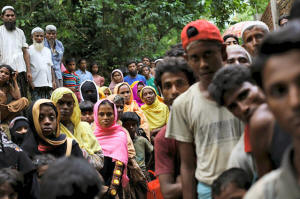|
'Alarming' surge in Rohingya refugees in
Bangladesh: UNHCR
 Send a link to a friend
Send a link to a friend
 [September 08, 2017]
By Krishna N. Das [September 08, 2017]
By Krishna N. Das
COX'S BAZAR, Bangladesh (Reuters) - An
alarming and unprecedented influx of 270,000 Rohingya has sought refuge
in Bangladesh over the past two weeks from violence in Myanmar, the U.N.
refugee agency said on Friday, a dramatic jump in the total as new
pockets of people are found.
A rights group said satellite images showed about 450 buildings had been
burned down in a Myanmar border town largely inhabited by Rohingya, as
part of what the refugees say is a concerted effort to expel members of
the Muslim minority.
Vivian Tan, a spokeswoman for the U.N. High Commissioner for Refugees,
said the estimated number of Rohingya who fled to Bangladesh since
violence erupted on Aug. 25 had surged from 164,000 on Thursday because
aid workers doing a survey had found big groups of uncounted people in
border areas.
"This does not necessarily reflect fresh arrivals within the past 24
hours but that we have identified more people in different areas that we
were not aware of," she said, adding that the number was an estimate and
there could be some double-counting.
But she added: "The numbers are so alarming - it really means that we
have to step up our response and that the situation in Myanmar has to be
addressed urgently."

The surge in the number of refugees, many sick or wounded, has strained
the resources of aid agencies and communities which are already helping
hundreds of thousands displaced by previous waves of violence in
Myanmar. Many have no shelter, and aid agencies are racing to provide
clean water, sanitation and food.
Two days ago, UNHCR had said the worst-case scenario was 300,000
refugees.
"We need to prepare for many more to come, I am afraid," said Shinni
Kubo, the Bangladesh country manager for the agency. "We need huge
financial resources. This is unprecedented. This is dramatic. It will
continue for weeks and weeks."
Rohingya have been fleeing their homes in Myanmar since at least 400
people were killed after insurgent attacks in Rakhine State two weeks
ago were followed by an army counter-offensive.
Myanmar says its security forces are fighting a legitimate campaign
against "terrorists" it blames for a string of attacks on police posts
and for burning homes and civilian deaths.
It says about 30,000 non-Muslims have been displaced by the violence.
About 1.1 million Rohingya Muslims living in Myanmar have long
complained of persecution and are seen by many in the Buddhist-majority
country as illegal migrants from Bangladesh.
"While most Rohingya refugees arrive on foot, mostly walking through the
jungle and mountains for several days, thousands are braving long and
risky voyages across the rough seas of the Bay of Bengal," the UNHCR
said.
[to top of second column] |

Rohingya refugees wait for food near Kutupalong refugee camp after
crossing the Bangladesh-Myanmar border in Ukhia, Bangladesh,
September 6, 2017. REUTERS/Danish Siddiqui

At least 300 boats arrived in Cox's Bazar on Wednesday, the
International Organisation for Migration said.
BURNED BUILDINGS
U.S.-based Human Rights Watch said satellite images taken last
Saturday showed hundreds of burned buildings in Maungdaw, a district
capital in Rakhine State, in areas primarily inhabited by Rohingya.
"The Burmese government has an obligation to protect everyone in the
country, but if safety cannot even be found in area capitals, then
no place may be safe," said Phil Robertson, the deputy Asia director
at Human Rights Watch said in a statement.
Several thousand people held a protest in Dhaka, the Bangladesh
capital, after Friday prayers against the crackdown on the Rohingya.
Similar protests were held in Indonesia and Malaysia, also
Muslim-majority countries. Scores of people also staged protests
outside the Myanmar embassies in Tokyo and Manila.
Malaysian Prime Minister Najib Razak said he was considering raising
the Rohingya issue when he holds talks with U.S. President Donald
Trump next week.
Earlier, the head of Malaysia's coastguard said it would not turn
away Rohingya and was willing to provide them temporary shelter,
although it is unlikely any refugees would travel hundreds of
kilometers south by sea during the monsoon season.
Najib told reporters the Rohingya issue had to be resolved "at the
source".
"It is unfair for affected parties to inflict more cost to Malaysia
to manage and to receive these people when they should be allowed
fundamental and universal rights that have been denied to them," he
said.

(Additional reporting by Kanupriya Kapoor in Jakarta, Rozanna Latiff
in Kuala Lumpur and Tom Miles in Geneva; Writing by Raju
Gopalakrishnan; Editing by Robert Birsel)
[© 2017 Thomson Reuters. All rights
reserved.]
Copyright 2017 Reuters. All rights reserved. This material may not be published,
broadcast, rewritten or redistributed. |